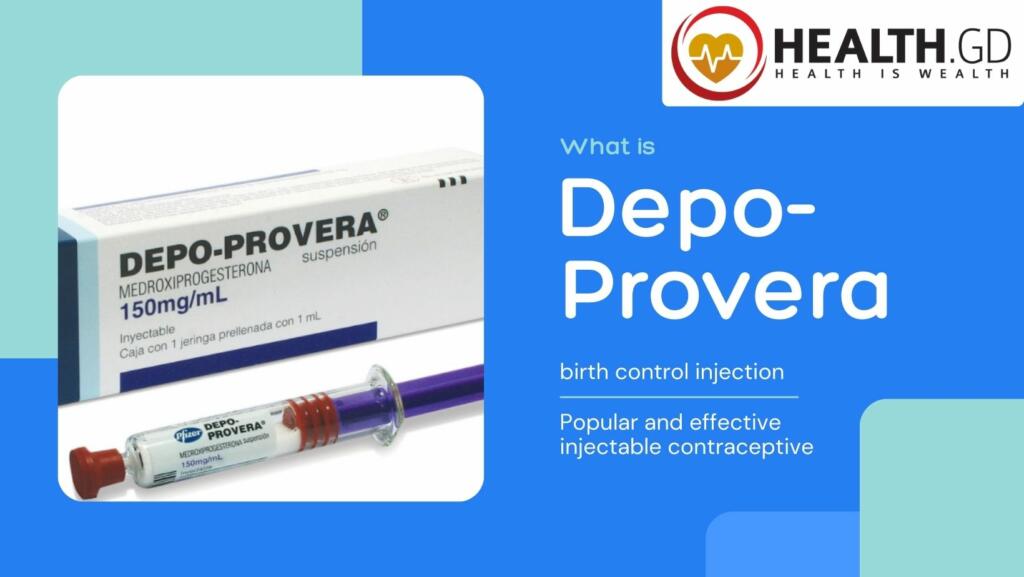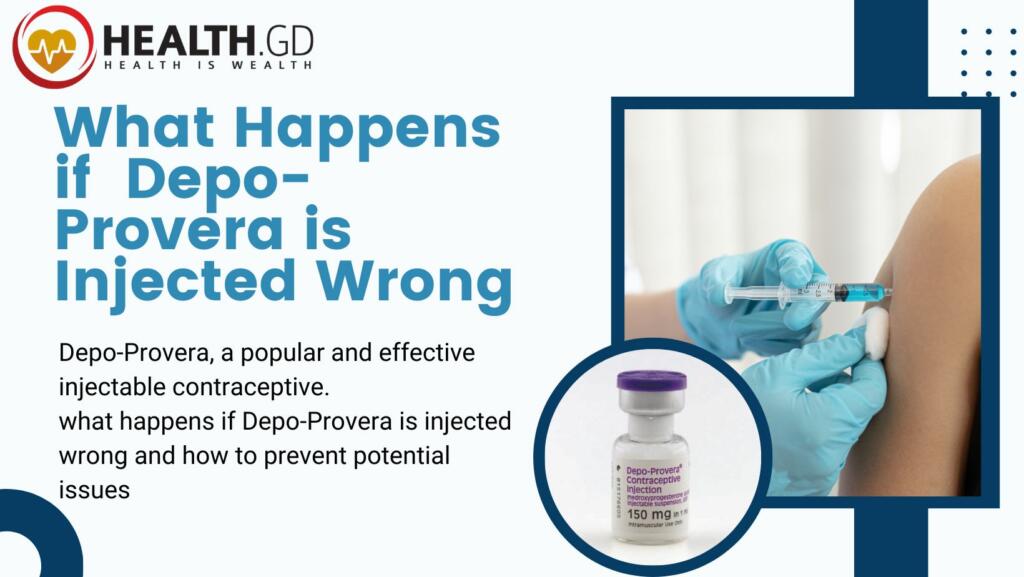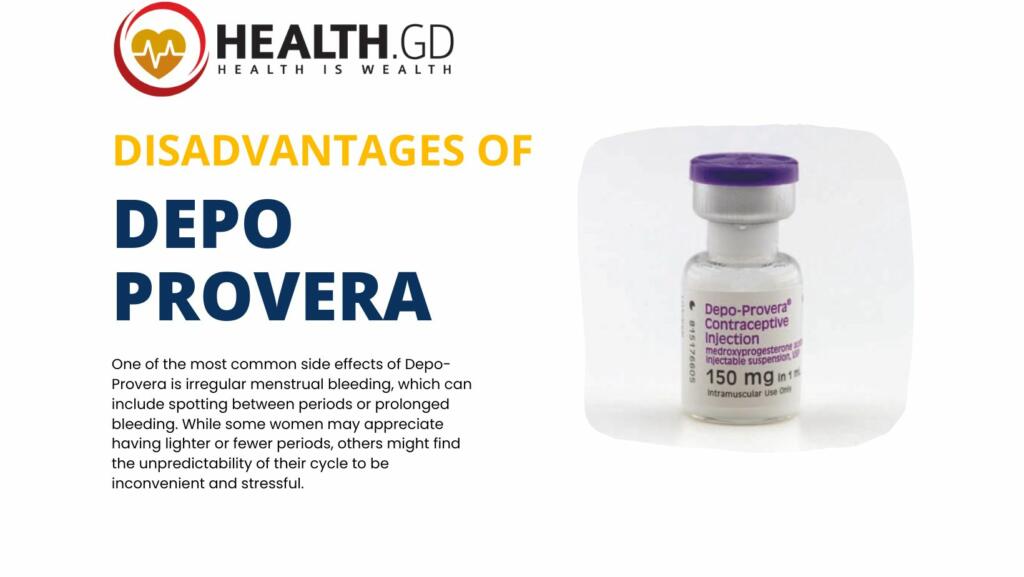Introduction
Birth control is an essential aspect of modern reproductive health. It helps couples to plan the timing of their families, reduces the risk of unplanned pregnancies, and empowers women by giving them greater autonomy over their reproductive choices. There are several contraceptive methods available in the market to choose from including Birth control pills, Birth control injections, and other hormonal methods. If we talk about birth control injection, one such injection is Depo-Provera, a popular and effective injectable contraceptive.
The birth control injection is designed to prevent pregnancy. However, like any medication, proper administration is crucial for its effectiveness. In this article, we’ll discuss what happens if Depo-Provera is injected wrong and how to prevent potential issues.

What is Depo-Provera?
Depo-Provera, also known as the birth control shot, is a type of hormonal contraceptive that contains a synthetic form of the hormone progesterone called medroxyprogesterone acetate. It is administered via intramuscular injections every 12 weeks to provide long-lasting, reliable pregnancy prevention.
How Popular is Depo Provera?
According to a 2017-2019 CDC report, around 3.1% of women aged 15-49 in the United States used Depo-Provera as their contraceptive method.
Effectiveness of Depo-Provera
Depo-Provera is a highly effective contraceptive method when used correctly, with a failure rate of less than 1% per year. With perfect use, its effectiveness is more than 99%, meaning fewer than 1 out of 100 women will become pregnant within the first year of using Depo-Provera. With typical use, which accounts for human error or inconsistent administration, the effectiveness rate is around 94%. This means that about 6 out of 100 women may become pregnant during the first year of using Depo-Provera.
How does Depo-Provera Works?
Depo-Provera works primarily in three ways:
Inhibiting ovulation
Ovulation is a natural process that occurs in a woman’s menstrual cycle. It is the release of a mature egg from the ovary, which then travels down the fallopian tube and becomes available for fertilization by sperm. Ovulation typically occurs about halfway through the menstrual cycle, or around 14 days before the start of the next period.
The progestin hormone in Depo-Provera suppresses the release of luteinizing hormone (LH), which is necessary for ovulation. Without ovulation, there is no egg available for fertilization by sperm, reducing the chance of pregnancy.
Thickening cervical mucus:
Cervical mucus is a fluid secreted by the cervix, a part of a woman’s reproductive system located at the lower end of the uterus. This mucus plays a vital role in the menstrual cycle and fertility, as it changes in consistency and volume throughout the cycle.
Depo-Provera causes the cervical mucus to become thicker and more viscous. This makes it difficult for sperm to swim through the cervix and reach the egg.
Altering the uterine lining:
The uterine lining, also known as the endometrium, is the innermost layer of the uterus. It is a mucous membrane that plays a vital role in the menstrual cycle and pregnancy. The hormone also affects the endometrium (the lining of the uterus), making it thinner and less suitable for implantation. If fertilization does occur, the fertilized egg will have difficulty attaching to the uterine lining, preventing pregnancy from progressing.
Advantages of Depo-Provera

1. Convenience
Depo-Provera’s long-lasting effect offers a convenient alternative to daily oral contraceptives or barrier methods. With an injection every three months, users don’t have to remember to take a pill or apply a barrier method during sexual activity.
2. High Effectiveness
When used correctly, Depo-Provera is one of the most effective birth control methods available, with a failure rate of less than 1%. This means that out of 100 women using Depo-Provera for a year, less than one will become pregnant.
3. No Estrogen-Related Side Effects
As Depo-Provera contains no estrogen, it may be a suitable option for those who cannot use estrogen-containing contraceptives due to medical reasons or side effects.
4. Reduces Menstrual Cramps
Some users of Depo-Provera experience lighter periods or even complete cessation of periods. This can be beneficial for those who suffer from heavy bleeding or painful menstrual cramps.
5. Private and Discreet
Since the injections are administered by a healthcare professional, there’s no need to keep contraceptive supplies at home, making Depo-Pro-Provera a private and discreet option. It’s an excellent choice for those who prefer to keep their contraceptive methods under wraps.
How Depo-Provera is injected?
Depo-Provera is typically administered through injections by doctors, either in the upper arm’s deltoid muscle or the buttocks’ gluteus muscle. The injection site and technique are crucial for the medication’s proper absorption and effectiveness. Doctors Slowly inject the medication, ensuring it is delivered deep into the muscle tissue.
What happens if Depo-Provers is injected Wrong?

Some common errors during the Depo-Provera administration include:
Injecting into the subcutaneous layer instead of the muscle.
Injecting too quickly or not deep enough.
Using a needle that is too short or too long.
If Depo-Provera is injected wrong into your body, you may feel the following effects in your body.
1. Ineffectiveness
If Depo-Provera is not injected properly, it may not be absorbed correctly. It reduces the effectiveness of the injection and increases the risk of unintended pregnancy. It’s essential to receive the injection from a trained healthcare professional to ensure its proper administration.
2. Localized reactions
Incorrectly administered injections can cause localized reactions such as pain, redness, swelling, or bruising at the injection site. These symptoms usually resolve within a few days but can be uncomfortable and you may feel irritation in your body.
3. Infection
Injecting Depo-Provera incorrectly increases the risk of infection, especially if the injection site is not cleaned properly or the needle is contaminated.
4. Nerve damage
Improper injection techniques, such as injecting too close to a nerve or using a needle that is too long, can cause nerve damage. This may result in pain, numbness, or weakness around the injection area.
Disadvantages of Depo-Provera

1. Irregular Menstrual Bleeding
One of the most common side effects of Depo-Provera is irregular menstrual bleeding, which can include spotting between periods or prolonged bleeding. While some women may appreciate having lighter or fewer periods, others might find the unpredictability of their cycle to be inconvenient and stressful.
2. Possible Bone Loss
Long-term use of Depo-Provera has been linked to a decrease in bone mineral density, which may increase the risk of osteoporosis later in life. However, studies have shown that bone density typically returns to normal levels after discontinuing the injections. It is crucial to discuss this potential side effect with your healthcare provider, who may recommend calcium and vitamin D supplements to help protect your bones.
3. Delayed Return to Fertility
After stopping Depo-Provera, it may take several months or even more than a year for fertility to return. This delay in the return of fertility can be a disadvantage for those who wish to become pregnant soon after stopping the injections. It is essential to consider this factor when choosing Depo-Provera as a contraceptive method.
4. Side Effects
Some users may experience side effects such as headaches, weight gain, and mood changes while using Depo-Provera. While not everyone will experience these side effects, it’s essential to weigh the potential risks against the benefits when considering this contraceptive method.
5. Lack of Protection Against STIs
Depo-Provera does not provide protection against sexually transmitted infections (STIs). Users should continue to use barrier methods, such as condoms, to reduce the risk of STI transmission during sexual activity.
Prevention and Remedies
1. Ensuring proper administration
To minimize the risk of incorrect Depo-Provera injections, it’s essential to Receive the injection from a trained healthcare professional.
2. Handling adverse reactions
If you experience any adverse reactions or suspect that your Depo-Provera injection was administered incorrectly, take the following steps:
Consult your healthcare provider as soon as possible.
Monitor the injection site for signs of infection, such as redness, warmth, or pus.
Seek prompt medical attention if you develop severe pain, swelling, or fever.
Conclusion
Depo-Provera offers several advantages as a contraceptive method, including high effectiveness, convenience, and the absence of estrogen-related side effects. While Depo-Provera is an effective and convenient contraceptive option, it’s crucial to ensure it is administered correctly to avoid potential complications. By understanding the importance of proper injection techniques and following the guidance of healthcare professionals, you can minimize risks and ensure optimal effectiveness.
However, it also comes with potential disadvantages, such as irregular menstrual bleeding, possible bone loss, and a delayed return to fertility. When considering Depo-Provera, it’s essential to weigh these factors and discuss them with your healthcare provider to determine if this birth control method aligns with your needs and lifestyle.
FAQs
Can I administer Depo-Provera myself at home?
It’s not recommended to administer Depo-Provera yourself, as it requires specific techniques and knowledge to ensure proper administration. It should be given by a trained healthcare professional.
How soon after an incorrect Depo-Provera injection can I get pregnant?
The effectiveness of Depo-Provera can be compromised if it’s injected incorrectly. If you suspect an issue with your injection, consult your healthcare provider immediately to discuss your options and the need for additional contraceptive methods.
Can I switch to a different contraceptive method if I’m worried about incorrect Depo-Provera injections?
Yes, if you have concerns about Depo-Provera injections, discuss alternative contraceptive options with your healthcare provider to find a method that best suits your needs and preferences.
Can incorrect Depo-Provera injections cause long-term complications?
In most cases, the consequences of incorrect Depo-Provera injections are temporary and resolve over time. However, in rare cases, improper injections can lead to more serious complications, such as infection or nerve damage. It’s essential to seek prompt medical attention if you suspect any issues with your injection.
How long does it take for Depo-Provera to become effective?
Depo-Provera becomes effective within 24 hours of the first injection if administered within the first five days of your menstrual cycle. If given at any other time, it’s recommended to use an additional form of contraception for the first seven days after the injection.
Can I use Depo-Provera while breastfeeding?
Yes, Depo-Provera is considered safe for use while breastfeeding. It does not affect milk production or the quality of breast milk.
Does Depo-Provera cause weight gain?
Some users may experience weight gain while using Depo-Provera, but it varies from person to person. Maintaining a healthy diet and exercise routine can help manage potential weight changes.
Is it possible to get pregnant after stopping Depo-Provera?
Yes, fertility usually returns after discontinuing Depo-Provera, although it may take several months or more for some women. If you plan to become pregnant after stopping Depo-Provera, discuss your plans with your healthcare provider.
Can Depo-Provera be used as emergency contraception?
No, Depo-Provera is not designed to be used as emergency contraception. If you require emergency contraception, consult your healthcare provider or pharmacist for appropriate options.






